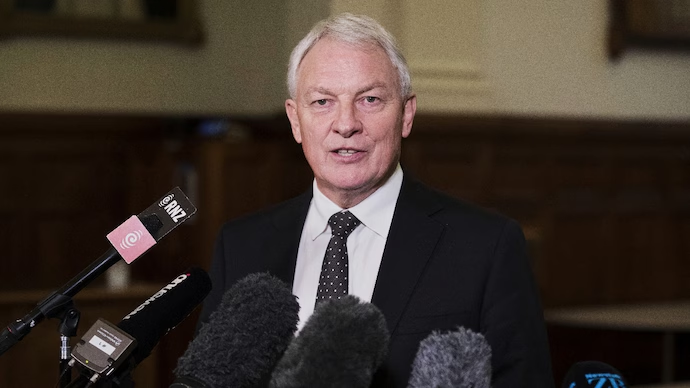
- The swift response reflects the need for New Zealand to stay closely aligned with the United States, a central partner in the Five Eyes collective intelligence-sharing arrangement, particularly in the aftermath of Trump’s mercurial and contentious foreign policy actions.
- The dismissal has provoked diverse reactions, with much dispute arising, as former Prime Minister Helen Clark criticized the decision in an X post, calling it a “very thin excuse” for sacking a highly respected former foreign minister.
- Phil Goff’s sacking has ignited debate over diplomatic freedom and New Zealand’s foreign policy priorities.
On March 5, 2025, New Zealand recalled Phil Goff, its High Commissioner in the United Kingdom, following his remarks on US President Donald Trump at a London public event. Winston Peters, the foreign minister, took the step, which is a sign of increased conflicts between international relations and diplomatic decorum.
Goff’s Remarks that Caused the Controversy
The incident happened during a Q&A session at a Chatham House event when Finnish Foreign Minister Elina Valtonen talked about how Finland’s proximity to Russia makes it necessary for her country to maintain positive relations with Russia. Phil Goff, High Commissioner to the UK since January 2023, quoted Winston Churchill’s well-known speech. During the Q&A session, Goff referring to former UK Prime Ministers Winston Churchill and Neville Chamberlain, said “I was re-reading Churchill’s speech to the House of Commons in 1938 after the Munich Agreement, and he turned to Chamberlain, he said, ‘You had the choice between war and dishonour. You chose dishonour, yet you will have war’”. He further stated, “President Trump has restored the bust of Churchill to the Oval Office. But do you think he really understands history?” This statement was seen as establishing a connection between Trump’s previous actions—such as stopping military aid to Ukraine after a dispute with President Volodymyr Zelensky—and previous appeasement trends.
The timing is noteworthy since Trump’s policy change has been compared to Chamberlain’s, which has sparked worries about how it may affect global security. The live broadcast of the event expanded the audience for Goff’s comments, which were perceived as disparaging Trump’s historical knowledge.
Government Response and Aftermath
New Zealand First Party and Deputy Prime Minister Winston Peters, who is Foreign Minister, said the role of Goff was “untenable” after these comments. In reported words to BBC News, Peters described the comments as “deeply disappointing,” going on to say that they were not the government’s beliefs. Peters made the statement without going to Prime Minister Christopher Luxon first, claiming jurisdiction as Foreign Minister.
Peters told reporters, “If he’d said it about Germany, France, Tonga, or Samoa, I’d have had to act. It is deeply regrettable and one of the hardest things one has had to do in his entire career.” This swift response reflects the need for New Zealand to stay closely aligned with the United States, a central partner in the Five Eyes collective intelligence-sharing arrangement, particularly in the aftermath of Trump’s mercurial and contentious foreign policy actions. The decision demonstrates a preference for diplomatic protocol over personal expression, underscoring the limits on diplomats to comply with official policies.
The dismissal has provoked diverse reactions, with much dispute arising. Former Prime Minister Helen Clark, under whom Goff served, criticized the decision in an X post, calling it a “very thin excuse for sacking a highly respected former foreign minister” and drawing parallels between 1938’s Munich Security Conference and current US actions, according to BBC. This implies that the dismissal could be viewed as an overreaction in New Zealand, particularly given the public nature of comparable arguments around the world.
Diplomatic Freedom and Foreign Relations
This event calls into doubt diplomats’ free speech rights. As the “face of New Zealand,” Goff was expected to reflect government ideas rather than personal beliefs, as Peters highlighted. However, detractors contend that this limits diplomats’ ability to engage in open discourse, particularly about historical similarities pertinent to present geopolitics. The sacking highlights New Zealand’s delicate balancing act in preserving connections with the United States and the United Kingdom, especially under Trump’s administration, which is recognized for its unusual approach to international affairs.
The dispute also highlights greater problems in global diplomacy, when identifying with powerful nations such as the United States might conflict with expressing one’s own opinions. For New Zealand, a member of the Five Eyes alliance, this episode may indicate a careful approach to avoid alienating critical partners.
References:
- New Zealand fires UK envoy Phil Goff over Trump comments
- https://www.rnz.co.nz/news/political/543936/winston-peters-sacks-phil-goff-as-uk-high-commissioner-over-comments-about-donald-trump
- https://www.nzherald.co.nz/nz/politics/phil-goff-let-himself-and-govt-down-with-reckless-donald-trump-comments-audrey-young/B5TUFQSQPJHGLP5ZGOLJZ5563I/
- https://www.aljazeera.com/news/2025/3/6/new-zealand-sacks-diplomat-who-questioned-trumps-understanding-of-wwii
- https://www.theguardian.com/world/2025/mar/06/phil-goff-donald-trump-comments-new-zealand-high-commissioner-removed-chatham-house-ntwnfb
Anisha Sharma is pursuing a Masters Degree in Diplomacy, Law, and Business at O.P. Jindal Global University. She has researched Southeast Asian geopolitics at the Nehginpao Kipgen Center and has authored research papers on geopolitical issues in Southeast Asia, Vietnam, Thailand, the South China Sea, and Indonesia. Views expressed are the author’s own.
